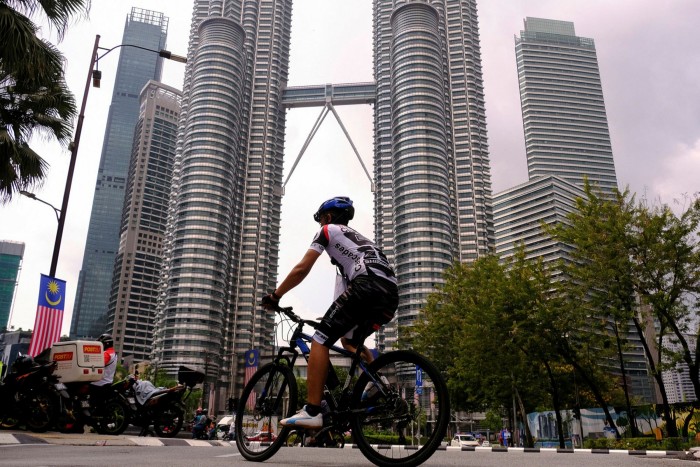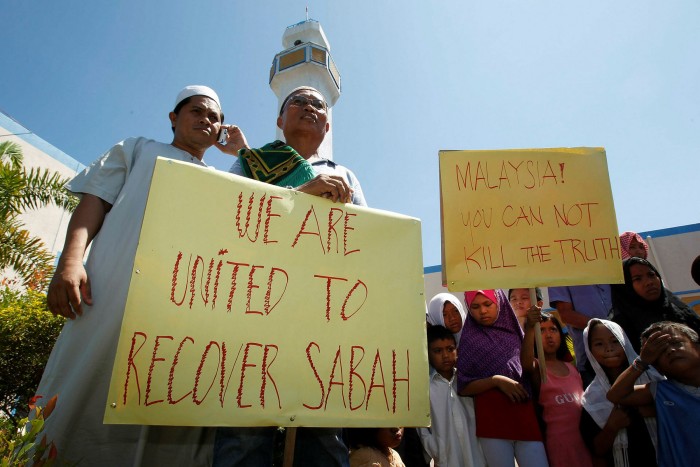It was a stunning salvo in a $15bn legal battle that centres on a Malaysian state about 11,000km away, and involves descendants of a former sultan, a land deal with British colonialists, a publicity-shy London-based litigation fund and a dispute 144 years in the making.
That same afternoon, the bailiff, appointed by claimants in the Philippines, visited the headquarters of nine banks dotted around Luxembourg, handing financiers across the European tax haven the same demand to freeze the accounts of the two Luxembourg-based subsidiaries — Petronas Azerbaijan (Shah Deniz) and Petronas South Caucasus.
When word of what was happening in Europe reached the Petronas headquarters in Malaysia — the twin 452m-high glass towers that dominate the Kuala Lumpur skyline — a terse statement from the company confirmed the delivery of the saisie-arret and vowed to fight for its assets.

The case, which until now has attracted little international attention, centres on competing claims over the oil-rich Malaysian state of Sabah. The eight claimants say they are the heirs of Jamalul Kiram II, the last formally recognised sultan of Sulu, a small archipelago in the nearby Philippines. For several years they have been seeking compensation for the land that their ancestor leased to a British trading company before the discovery of vast natural resources in Sabah. The heirs, backed by a London law firm, have been bankrolled by a UK investment fund, Therium, in a litigation process that has now cost in excess of $10mn.
Petronas, whose business generates 11 per cent of Malaysian government revenues, was only dragged into the case with the seizures on Monday. The proceedings have been described by legal experts as one of the most unusual international arbitration disputes in history.
It does not seem to have a precedent, says Colin Ong QC, a prominent arbitration lawyer not involved in the case. “No one could have predicted 144 years ago that an agreement signed in Borneo during British colonial times would give rise to such a dispute today.”
In March, an arbitrator in France, Gonzalo Stampa, ruled in favour of the sultan’s heirs and found that Malaysia, which inherited the obligations of the 1878 lease agreement upon securing independence from the UK in 1963, must pay them $14.9bn in compensation. An earlier hearing in Spain had stalled after Malaysia complained that communications were not properly handled.
Malaysia is appealing against Stampa’s ruling and has condemned the case as an attack on its sovereignty. Some Malaysians have even questioned whether the claimants are the genuine heirs of the Sulu sultan.

A day after the seizures, a Paris judge suspended the enforcement of the $14.9bn award until the appeal is concluded. This prompted Kuala Lumpur to declare that the award could no longer be enforced anywhere in the world. But independent legal experts and a Spanish PR company, Estudio de Comunicación, which is representing Malaysia in Europe, confirmed that the suspension only applies in France.
Although the arbitrator made his decision in February, the Malaysian government was caught off guard by the asset seizures in Luxembourg and by the prospect that they could now continue elsewhere. The move sparked panic in Kuala Lumpur, with two Malaysian MPs seeking an emergency debate in parliament and the government announcing plans to launch a Sulu “task force”.
The Sulu heirs’ representatives argue they were pushed to take these measures after Malaysia refused to engage. Paul Cohen, lead counsel for the claimants and a lawyer at London-based 4-5 Gray’s Inn Square, says litigation was the “final resort”.
“More than one Malaysian government refused to respond to our clients’ direct approaches in the past few years,” Cohen says. “Given that the Malaysian government knew who they were, and knew every aspect of a 140-year-old contract, this was clearly a tactic to freeze off confrontation and resolution.”
Bankrolling the sultan’s heirs
The award could also deliver a windfall for London-based investor Therium, which according to multiple people close to the case is backing the Sulu heirs financially. The cost of pursuing arbitration cases over a number of years represents a substantial financial gamble on the outcome of each case, and would typically run into tens of millions of dollars. The eight descendants, who live in the Philippines, are not wealthy and include several retirees according to their representatives.
The litigation fund, which says it has raised $1.1bn to finance various cases since it was founded in 2009, declined to comment. In the past, it has publicly backed less geopolitically sensitive cases, such as last year’s high-profile appeal against the wrongful conviction of UK Post Office workers.

The case has come at a critical time for Malaysia, which has had three prime ministers in as many years. The south-east Asian country has been embroiled in a political crisis since 2015, amid subsequent revelations that billions of dollars had been embezzled from 1MDB. Petronas, one senior Malaysian minister recently suggested, will be central to the government’s efforts to rebuild the post-pandemic economy.
The state-owned enterprise has this year cashed in on soaring oil prices sparked by the war in Ukraine. In the first quarter, its pre-tax profits surged 114 per cent to $7.1bn compared to the same period in 2021. Zafrul Aziz, Malaysia’s finance minister, told the Financial Times in April that the boom in commodity prices could help Malaysia reduce its debt.
But additional seizures by the Sulu heirs could set back Malaysia’s recovery.
The present value of the Luxembourg holding companies seized by the Sulu heirs is unclear. In February, they liquidated a 15.5 per cent stake in Azerbaijan’s Shah Deniz offshore gasfield, previously valued at almost $2.3bn. Petronas said the proceeds from this sale were “repatriated”, but declined to comment on how much the subsidiaries are worth now.
As long as Malaysia refuses to accept the award, its debt to the claimants is likely to increase. For every year it goes unpaid, the money owed will increase by 10 per cent, it was decided in Paris.

Zafrul dismissed the significance of the French ruling in April. “The Malaysian economy size is RM1.5tn. The $15bn is about RM40bn . . . Our country, [will] we crash after [losing] that 3 per cent?” he asked sarcastically. He dismissed the claim as “a frivolous, no-basis case”.
Legal fight goes global
The case has touched a nerve in Malaysia, which has fended off claims to Sabah, a region measuring roughly 74,000 sq km with a population of almost 4mn, for decades. The Philippines, which lies to the north east, has a historical claim to the state that some politicians have continued to revive.
Jamalul Kiram II died in 1936 without leaving a direct heir, but since then a procession of Filipino citizens have made claims to the throne that for centuries ruled a region spanning modern day Malaysia and the Philippines. One man, Muedzul Lail Tan Kiram, reportedly still claims to be the living sultan of Sulu.
In 2013, the followers of one self-proclaimed heir arrived in Sabah to lead an invasion that plunged the normally peaceful corner of Malaysia into violent chaos. During the ensuing fight with security forces, at least 60 people were reported killed before the invaders — who numbered no more than 180 — retreated.
Up to that time, the claimants said Malaysia had paid them an annual stipend of $5,300, in recognition that they were relatives of the late sultan and successors of the 1878 agreement. After the attack, Kuala Lumpur halted the payments, despite a former Malaysian attorney-general later acknowledging there appeared to be no evidence linking the armed invaders with the heirs who had been receiving the yearly fees.
In 2017, the descendants declared their intention to take legal action, a move that has reignited anxiety over Sabah in Malaysia and exposed Britain’s messy colonial legacy in the country.
“This case is the history of colonialism, with a twist,” says Elisabeth Mason, a lawyer at 4-5 Gray’s Inn Square.

“Imagine that, instead of buying Manhattan for 60 guilders, Peter Minuit signed a perpetual lease,” says Mason, referring to the Dutch colonialist who acquired Manhattan Island from the Lenape Native Americans. “Surely by now, the Lenape tribe would have looked from Wall Street up Broadway to Lincoln Center and Central Park and concluded: ‘60 guilders isn’t anywhere near enough. It’s high time to renegotiate this deal.’
“That’s exactly what’s happened here,” she adds.
Malaysia has on several occasions attempted to shoot down the proceedings. It now says it has opened a criminal investigation into Stampa, who began the proceedings in Spain but moved the case to France after it was suspended in Madrid. Stampa declined to comment. According to Ong, international law allows arbitration hearings to be relocated when they become “unduly difficult”.
Following the arbitrator’s ruling in February, independent lawyers were bemused by Kuala Lumpur’s decision to send “diplomatic notes” to every signatory of the New York Convention on enforcing arbitration awards, of which Malaysia is a member. Such a move, they said, suggested that Malaysia hoped it could influence foreign courts.
“How can that even be done?” asks Roger Chin, partner at Chin Lau Wong & Foo and president of the Sabah Law Society. Malaysia is “in a way [undermining] judiciaries’ independence by saying: ‘don’t look at it’. That is obviously quite wrong”.
A representative for Malaysia said the country is taking “every action it deems necessary to make known its position regarding the conflict”. They added that the arbitration was not valid after Stampa’s appointment was overturned in Spain, and the award’s suspension in Paris is grounds for other countries to refuse its enforcement.
The right heir?
Stuck in the middle of the legal wranglings are the people of Sabah, Malaysia’s poorest state, where according to government data almost a fifth of the population lived below the poverty line in 2019. While those the FT spoke to were strongly opposed to the Sulu descendants’ claims, they also felt let down by the national government.
A revolving door that has delivered three governments in three years has impeded efforts to challenge the case, according to Chin. “With different attorneys-general and each one coming in without having served for a very long time, that really has an effect.”
The national government needs to bring the people of Sabah into the discussion, says Shari Jeffri, a banker who has been researching the region’s history for 20 years. He says he has historical records showing the land was never the Sulu sultan’s to lease in the first place, as it belonged to the sultan of Brunei.
“Why are [the Sulu heirs] bringing up the historical claim? I would rather the Malaysian government give the money to Sabah,” he adds. “We need the infrastructure.”
The claimants say they intend to dedicate a “sizeable percentage” of the proceeds to addressing issues in the region spanning the former sultanate of Sulu, including education, healthcare and housing.
The case has also reignited fears about the Philippines reopening its claim to Sabah. Its new president, Ferdinand Marcos Jr, is the son of the late dictator who once argued Sabah belonged to the Philippines.
“The arbitration ruling has given ordinary Filipinos [the idea that] they have a chance of success,” says Yong Teck Lee, former chief minister of Sabah. “Among ordinary Malaysians in Sabah, at the back of our mind is this anxiety.”
The most pressing issue for the government in Kuala Lumpur is how to prevent the Sulu heirs from hoovering up more of the state assets that form the backbone of the national economy.
The claimants’ lawyers warn that more state assets will be pursued unless a resolution is reached.
“International law doesn’t let you pick and choose,” says Cohen. “Either Malaysia honours its international obligations, or it goes ‘full Russia’.”
“The seizure process is a rolling programme that is designed to meet our clients’ financial demands,” he adds. “But we hope Malaysia will see the cost of being a legal pariah state and come to terms.”
Additional reporting by Eleanor Olcott in Taipei








